Whether you’re new to SEO or are a seasoned expert, you’ll need to have the right tools to help you optimise your website.
SEO is a big topic, with many different elements that affect a site’s performance. It’s important to stay on top of all these different areas to ensure your site is performing well for both your visitors and for search engines.
This can be near impossible to achieve without the right tools.
From developing SEO-friendly content to making technical fixes on your site, SEO tools are necessary companions.
To help you improve your SEO strategy, gain better insights, and make your life easier, this guide covers some of the best SEO tools that both beginners and experts need to know about.
Why Do You Need SEO Tools?
There’s a lot that goes into successful SEO. Whether you’re performing on-page, off-page, or technical SEO tasks, you’ll want to make sure that the process you used is backed up by data. SEO tools make it easy to access the right data and ensure you optimise your SEO strategy in a smarter way.
There are all kinds of SEO tools that exist – with each different one offering unique functions.
You might want to check the performance of your website, monitor your competitor’s websites, discover new SEO opportunities, or find ways to optimise your content. Whatever the case, SEO tools exist to make these processes more efficient.
Not only do SEO tools make your life easier, but they ensure your SEO strategy is on the right path. Without the right tools, you might base your SEO efforts around guesswork – something that could result in low or no-impact SEO tactics.
So, SEO tools are essential for saving you time and manual effort while ensuring your SEO strategy is working. With a smart mix of SEO tools, you can make some major improvements to your website performance.
15 Best SEO Tools for Beginners and Experts
Whether you’re just starting your SEO journey or are looking for an advanced tool to optimise your site, here are some of the most essential SEO tools you need to know about. These tools can help you improve a wide range of areas in your SEO strategy.
1. Google Search Console
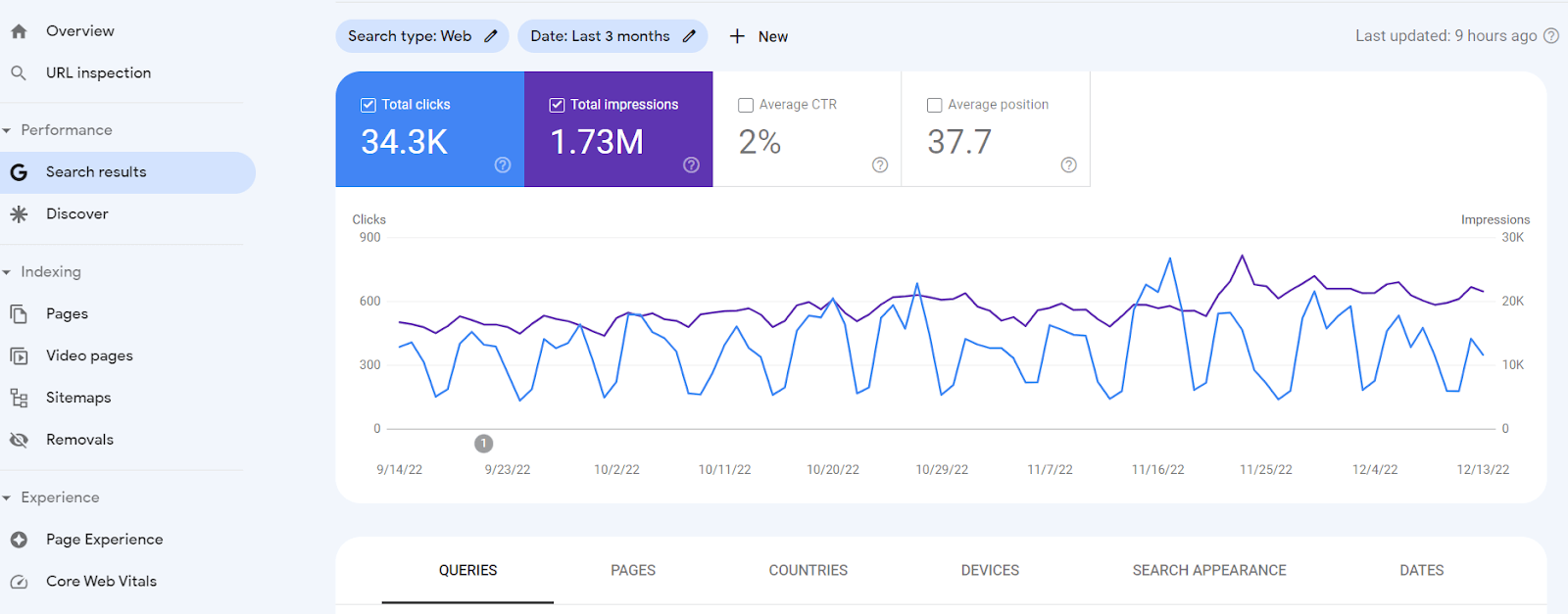
Google Search Console is the first essential SEO tool that every website needs to utilise. It’s a free platform that offers detailed insights into how your website is performing in Google search results.
These insights are critical for guiding your SEO strategy, understanding your site’s performance, and knowing where and how to optimise certain areas of your site.
Once you set up Search Console for your website, you can use the platform to run reports on your entire website’s Google search performance, or on the performance of individual pages. Some things you can look at include the page’s impressions, clicks, average position, and organic search terms that the page is ranking for.
Digging into this data can help you discover what keywords your pages should be optimised for, what competitors your page is up against, and where new high-traffic keyword opportunities exist.
You can also use Search Console to monitor your site’s Core Web Vitals performance, see how structured data is performing on your site, monitor mobile optimization, and more.
Regularly reviewing your Search Console performance is essential for any website owner. This will give you a solid overview of your website performance traffic, possible issues, and opportunities.
Not familiar with GSC? Use this Google Search Console guide for practical tips!
2. Google Analytics
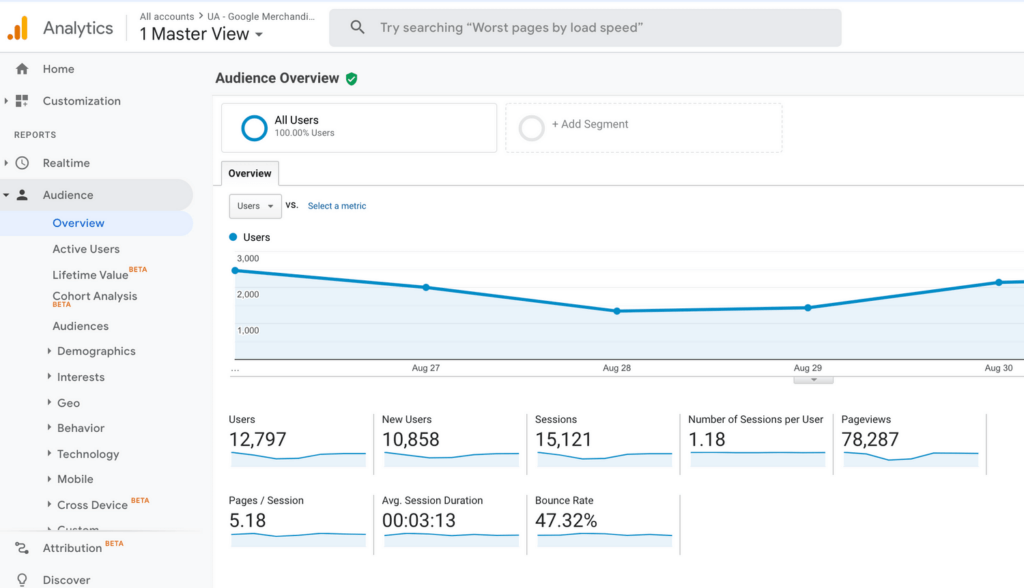
While we’re on the topic of free Google tools, Google Analytics is another necessary SEO tool for any website owner.
While you can use Google Analytics to measure various areas of your digital marketing strategy, it offers some important insights to guide your SEO efforts.
You can use Analytics to understand where your traffic comes from and how much of your website traffic is organic. You can use the platform to identify your top-performing web pages, compare pages, understand your web traffic, and so on.
This is a detailed tool that offers plenty of detailed insights. This means you can use Google Analytics to review metrics like your bounce rate, time spent on the site, how users navigate through your site, and more.
Accessing these analytics is necessary for developing a smarter SEO strategy. It lets you identify which areas of your site need to be improved, which pages are performing well, and where opportunities exist.
3. Ahrefs
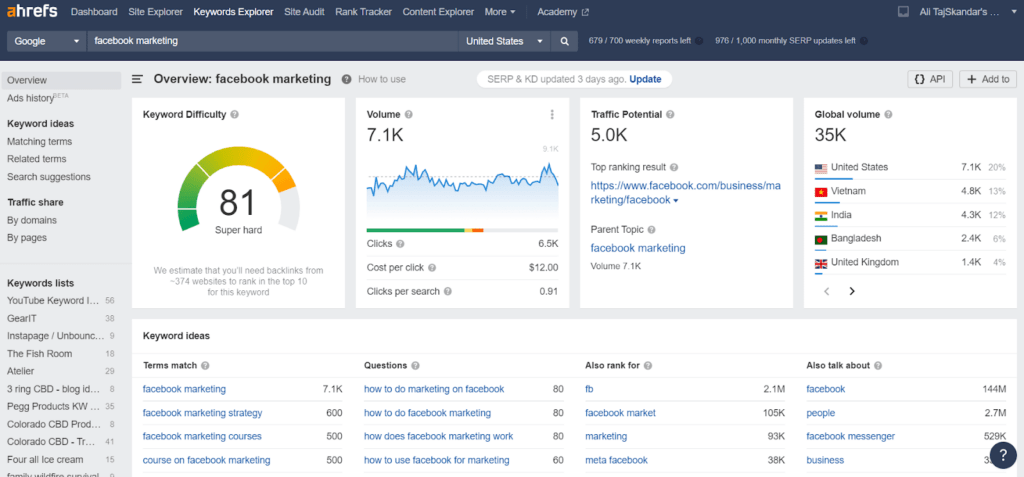
When it comes to SEO tools, Ahrefs is one of the most popular options for beginners and experts. This insightful SEO tool provides a wide range of features that you can use to understand your website’s SEO performance, monitor your competitors, identify keywords, and develop a stronger SEO strategy.
Ahrefs includes an excellent keyword research tool. This lets you discover detailed keyword data and find new keywords for your site to target. You can assess things like the keyword difficulty and traffic potential, and review the top competitors for each keyword in the dashboard.
You could also use Ahrefs to gain deep insights into websites and specific web pages. By searching for specific URLs in the tool, you can see things like that web page’s organic traffic, how many backlinks the page has, what organic keywords the page is ranking for, and more.
Importantly, Ahrefs also lets you run a complete SEO audit on your site, This is when the tool crawls your entire site and helps you identify potential SEO errors and opportunities.
Ahrefs also provides a general SEO health score for your site. You can review your domain rating, review your website’s backlinks profile, and more.
Whether you’re looking for a tool to gain really granular SEO data on your or your competitors’ websites or if you just want to gain a high-level overview of your site’s SEO performance, then Ahrefs is one of the leading SEO tools to use.
4. SEMRush
SEMRush is one of the most popular SEO tools available thanks to its wide range of features and the advanced data that the platform offers.
You can use SEMRush to easily assess your website and its search performance. You can also use the tool to gain fast insights into your competitors’ SEO strategy and performance. This can help you develop a more strategic SEO direction, and identify new ranking opportunities.
Like any extensive SEO tool, SEMRush includes an insightful keyword research platform. This lets you discover keyword ideas and access all the metrics you need to know about these keywords.
The platform includes popular features called Domain vs Domain Analysis, which lets you directly compare your website to your competitors. This is a great way to refine your SEO strategy.
SEMRush offers an On-Page SEO checker tool to help you identify your on-page SEO performance and find areas to improve. The tool provides excellent organic traffic insights. You can also use SEMRush to run a complete SEO audit on your site to discover detailed insights on your SEO performance and possible opportunities and errors.
SEMRush is one of the most popular tools that you’ll find in most SEO experts’ arsenals.
5. Moz
Moz offers a fairly extensive selection of SEO tools and features to help websites improve the way they perform in the SERPs. The platform also includes various free tools and plans, although we’re going to focus on Moz Pro – the platform’s premium SEO tool.
Moz Pro is another full-service SEO platform that provides detailed insights into keyword analysis and recommendations, as well as your site’s SEO performance as a whole.
You can use Moz to run a detailed site audit on your website, monitor your competitors’ SEO performance, perform backlink analysis on your site, and more.
This SEO powerhouse also offers a handy free extension called MozBar, which lets you easily review any website’s page metrics while you browse the page. This is a great tool for gaining fast SEO insights and reviewing competitors while you’re in the SERPs.
It’s also worth noting that Moz came up with the Domain Authority (DA) metric, which many websites use as the standard for understanding their relative competition and site authority. Moz does let you check your site’s DA for free with its Domain Authority Checker, which is very helpful for guiding any site’s SEO strategy.
6. Ubersuggest
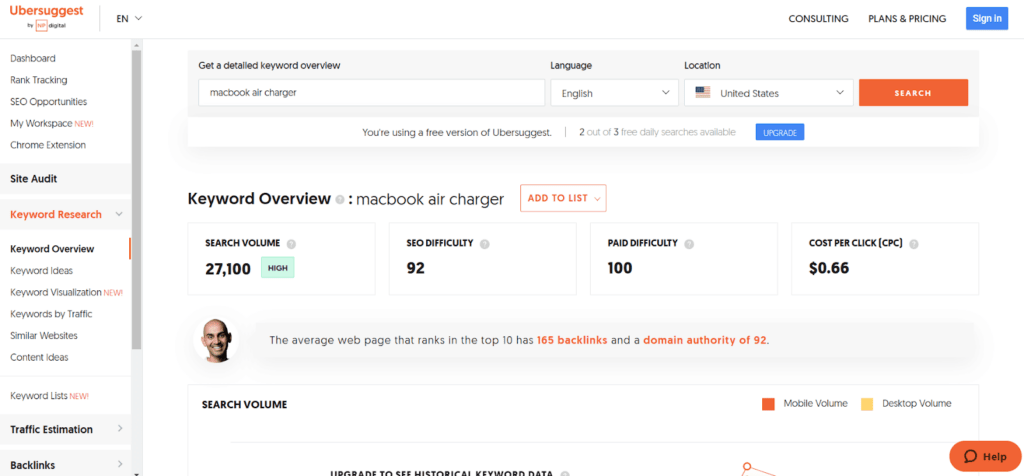
There are loads of keyword research tools out there that offer advanced insights and detailed metrics on keyword opportunities. If you’re looking for a relatively straightforward and free tool, then Ubersuggest is one of the best options.
This free tool by Neil Patel lets you search for keywords and discover keyword ideas based on your content topic. You can access the essential metrics around each keyword, like search volume, difficulty, and cost per click.
This is a great tool to quickly discover short-tail and long-tail keywords that you can target in your digital content strategy. You can also gain keyword insights for both organic SEO as well as paid targeting.
Just be aware that Ubersuggest as a free tool does limit its searches to 3 per day. If you want to gain more insights, you’ll have to pay for this software.
7. Wordstream Free Keyword Tool
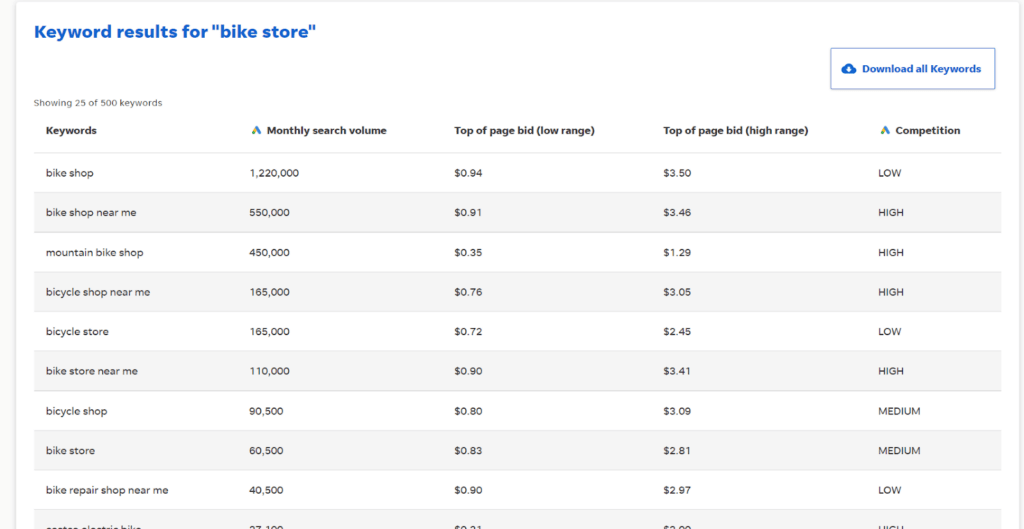
Speaking of free keyword research tools, Wordstream offers another excellent solution. Wordstream is a platform focused on paid advertising tools. However, its free keyword research tool is an absolute gem for SEO beginners.
This tool lets you search for keyword ideas and access the relevant keyword data you need to know – like search volume and difficulty. You can use this tool to find out about keywords you already know or to discover new long and short-tail keyword opportunities.
While it’s certainly not the most robust SEO tool, it does offer fast and easy keyword insights for free. This makes it a great starting point for guiding your content strategy.
8. Surfer SEO
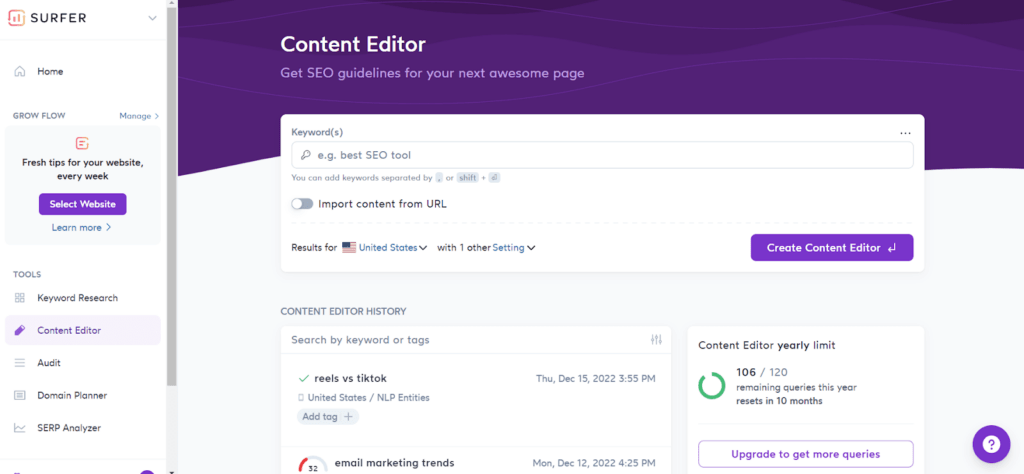
A major part of successful SEO is creating the right SEO-friendly content. Surfer is a fantastic tool to help you achieve this.
Surfer uses AI to analyse the top-performing search results for specific keywords and uses this to help you find ways to optimise your content. If you’re writing new content for your site or are updating your existing content, then Surfer can help you streamline the process.
Surfer’s most popular feature is its Content Editor. With this tool, you input your target keyword before writing content, and the tool grades your content as you write.
It shows suggestions for keywords and phrases you should include in the content and how many times you should include them. It also reveals things like the optimal content length, how many headings your content should have, and how many images your content should include. This is all based on data from the SERPs, so it’s an easy way to help you create optimised content from the start.
Surfer also includes a Content Audit tool that lets you improve existing content. You can use this to discover things like backlinks and internal link opportunities for the content, it reviews your keyword density and helps flag errors or opportunities in your content that you can fix.
You can also use Surfer’s Content Planner tool to help you map out your content strategy, discover keywords to target, and figure out what topics to write about to help your site target valuable SEO opportunities.
A great feature of Surfer is that it offers a browser extension so that you can use the content editor in Google docs.
9. Answer the Public
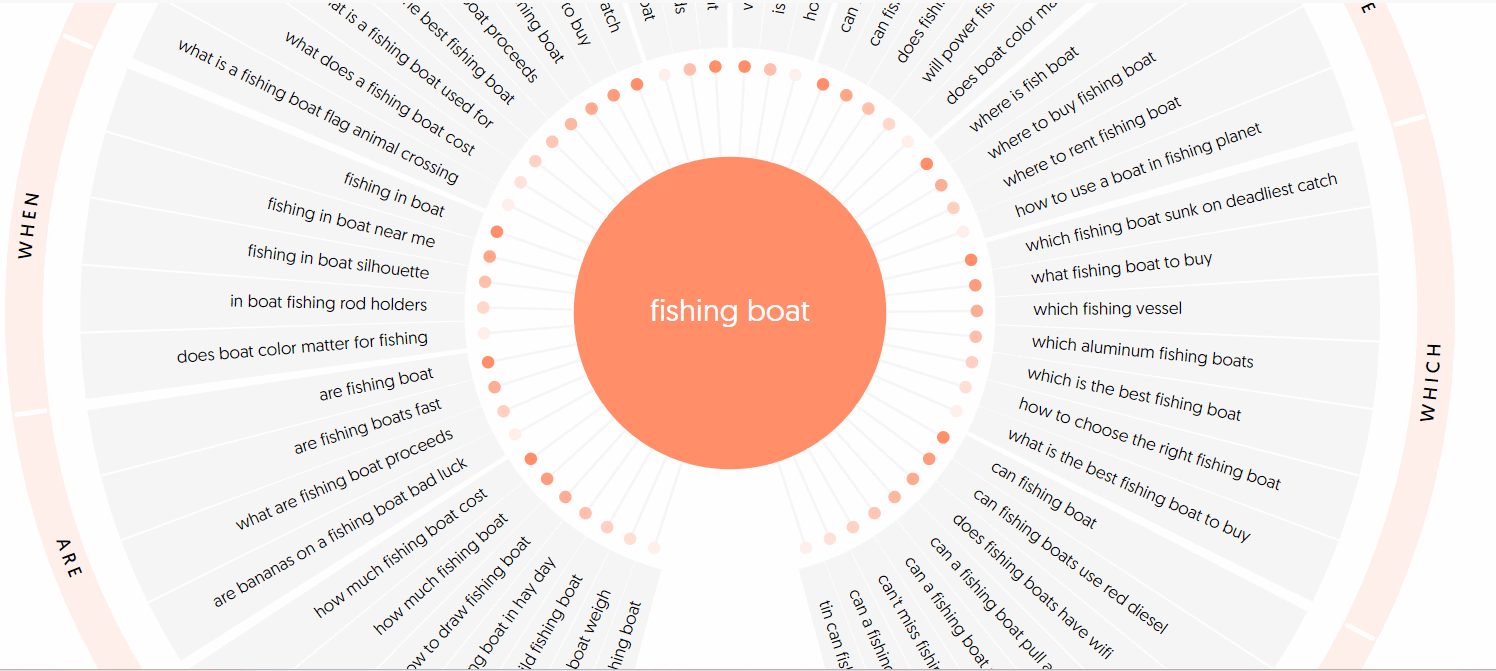
Looking for SEO-friendly topics to write about on your blog? Then Answer the Public is a great tool.
While this may not be the most advanced SEO tool in the sense that it offers direct SEO data, Answer the Public does help you visualise trending content and topic ideas.
You can use the tool to review your niche and discover new keywords and content opportunities based on the kind of topics people want to know about. If you want to make the most of your content and ensure you target every possible element of your content, then Answer the public can be golden.
The tool takes no time to use and can help you instantly come up with a list of topic ideas to cover. This can maximise your SEO efforts as well as help guide your broader digital content strategy as a whole.
10. PageSpeed Insights
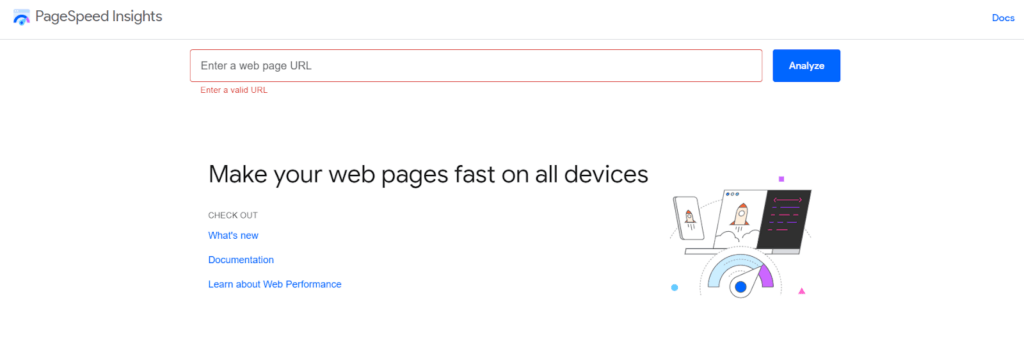
Page speed is an important ranking factor. In order to ensure your website is performing efficiently, you’ll need to keep a close eye on your page speed performance metrics. PageSpeed Insights is one of the best tools to help you achieve this.
PageSpeed Insights lets you test the load time and core web vitals on your website. Doing this helps you easily identify any page speed issues on your site, which you can optimise for better search engine performance.
Improving page speed across your site helps the user experience, but it can also directly improve your rankings. If you want to improve this critical area of technical SEO, then using PageSpeed Insights is a must.
11. Screaming Frog SEO Spider
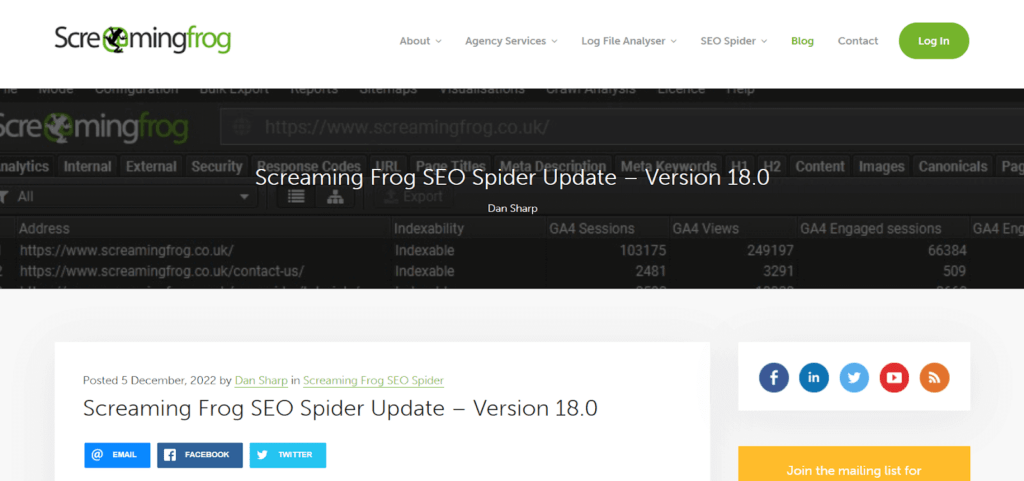
Screaming Frog SEO Spider is a web crawler tool to help you analyse the structure of your website. This tool offers a smart solution if you want to take a deep dive into your site, extract data from your web pages, and audit for common SEO issues.
If you’re looking for a technical SEO tool, then Screaming Frog will become your best friend. Not only because it offers advanced insights into your website structure, but it’s also easy enough for beginners to use.
If you’re still new to technical SEO, then you can use Screaming Frog SEO Spider to gain a lot of helpful knowledge. Although the more you know about HTML and technical SEO, the more useful this tool will be.
Screaming Frog can quickly inform you about common SEO errors to fix on your pages, duplicate content, opportunities for smarter link building, and bad link redirections. It’s an efficient and accurate tool that gets you the data you need for an effective SEO audit.
12. Google Schema Markup Testing Tool
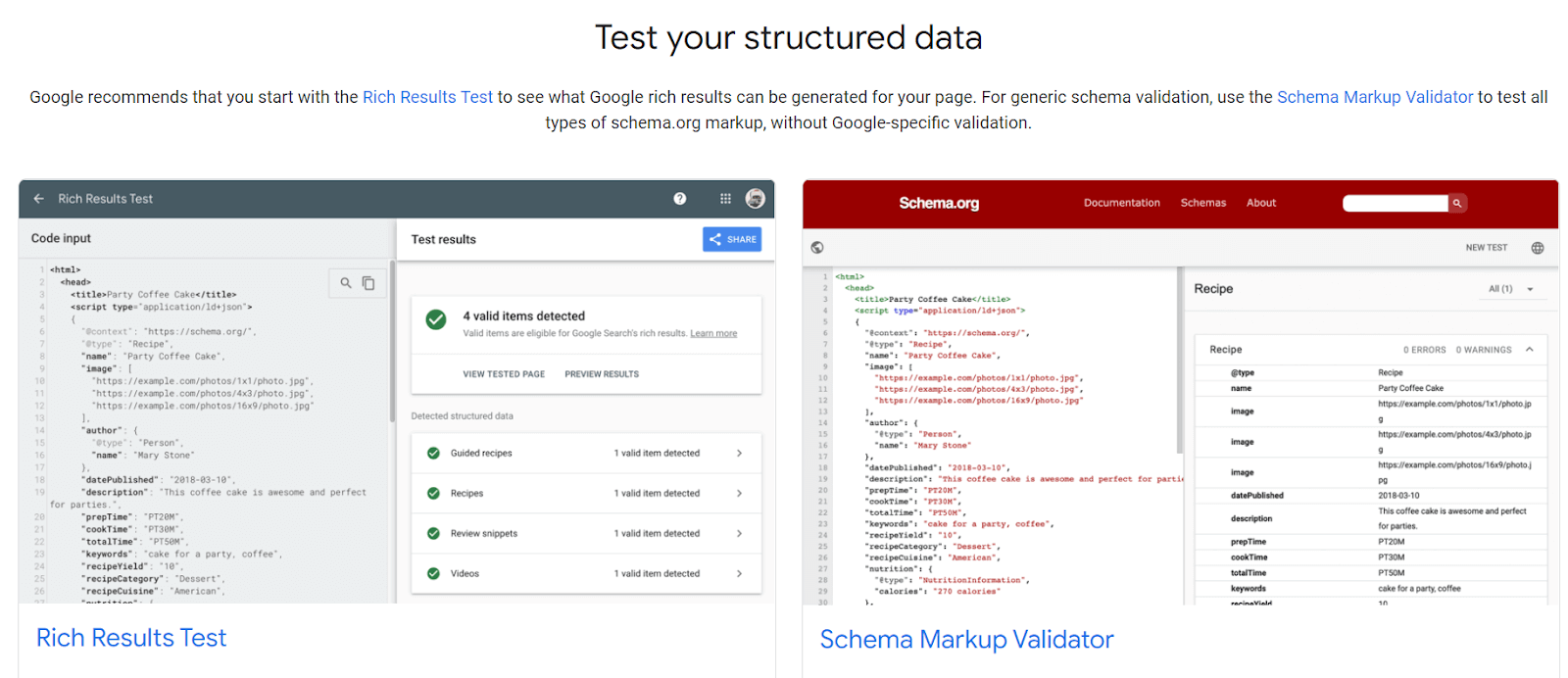
Google’s free Schema Markup Testing Tool is one of the best SEO tools for creating and testing structured data on your website. If you want to win rich snippets in the SERPs, then you’ll need to apply schema to your site.
To do this, you can add your web page content to the tool and mark up the different sections on your site. You can then use the Schema Markup Validator to test your structured data and see how it will work in the search results.
You can also use Google’s Rich Results Test tool to see whether your page supports rich results and to test how this would look. This is a helpful way of identifying any rich results issues or errors, which you can use the tool to easily fix.
Adding structured data to your pages is relatively simple to do with the right tools, and it can help you gain a lot more value from your search results listings.
13. Keywords Everywhere
Keywords Everywhere is a handy Chrome extension that can help you find the best keywords for your website’s top rank. The extension aggregates data from Google Analytics, Search Console, and Google Trends to help you understand the right keywords.
You can use the tool directly in Google SERPs to access keyword data directly in the search results. You can also bulk upload lists of keywords to the tool.
This is a very useful tool for helping you come up with content ideas. Best of all, it’s free.
14. Google Trends
If you need help looking for popular content topics to write about on your blog, then Google Trends is fantastic. This free Google site analyses the popularity of different search queries in Google Search. You can compare this data across different regions and languages to help you discover popular and trending topics that your audience is interested in.
Google Trends also offers graphs that reveal the search volume of these different queries over time. Ideally, you’ll want to look for topics and queries that are rising in popularity. This can help you gain more SEO success.
Using Google Trends to discover content ideas can be a great way to publish content on topics that are gaining an increasing amount of search queries. Doing this can help you tap into potentially high-traffic topics and keyword ideas, which can give any website a major boost.
15. KWFinder
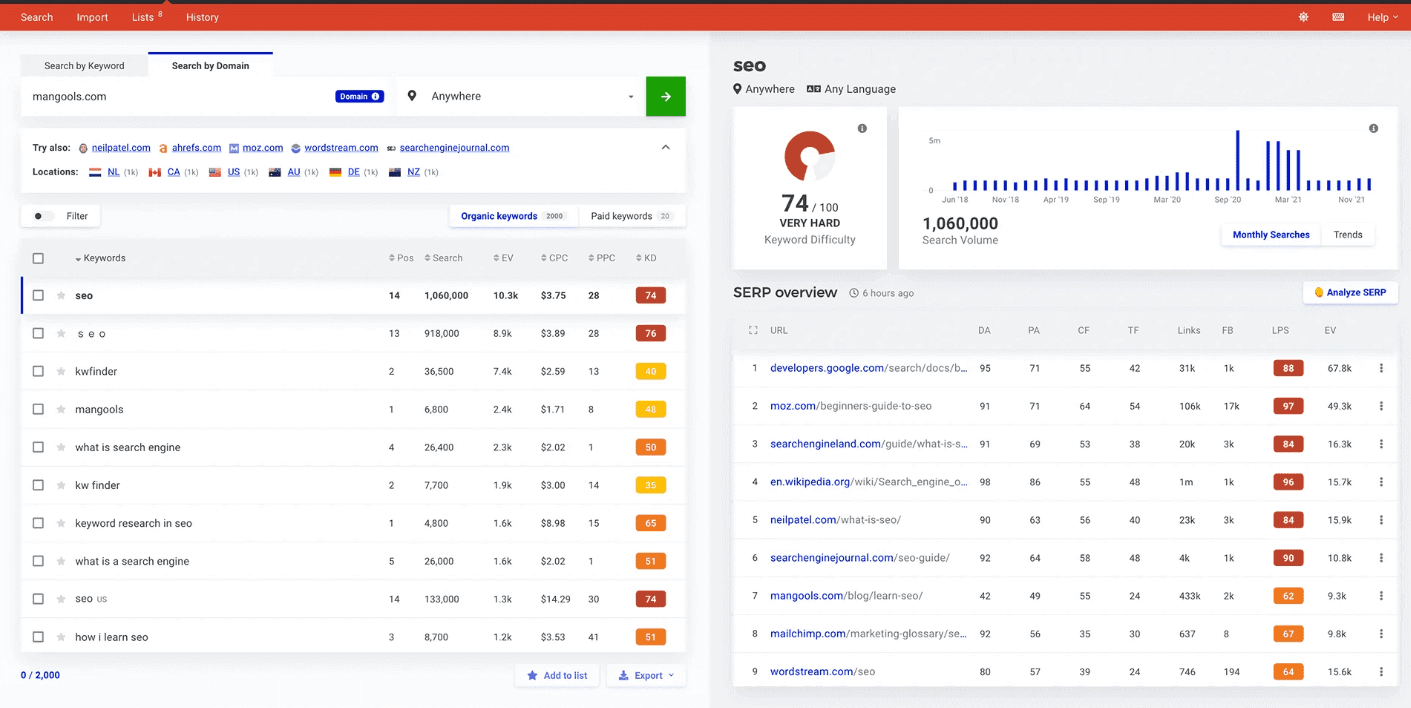
Keyword research is one of the most important elements of successful SEO. To do this properly, you’ll need to carefully evaluate as many different keyword options as possible, and find the right keywords with relevant search intent and low competition. KWFinder is a great tool to help you achieve this.
KWFinder is focused on finding long-tail keywords with lower levels of competition. These keywords often offer more value to your website, as they help you to target more relevant, qualified traffic.
Besides the keyword research tool, you can also use the platform’s SERP Analysis tool to better understand the competition for certain keywords. You can then use the Rank Tracker tool to help you understand your page’s ranking while tracking how this improves.
As a keyword research tool, KWFinder is one of the most comprehensive options. It lets you find keywords, understand your possibility of ranking for them and monitor your search engine performance for these keywords.
Summary
While there are loads of SEO tools out there, this list includes some of the best, most tried-and-tested options available. From technical fixes to content ideation, these tools can help you improve your SEO strategy while making your life a lot easier.
If you’re not relying on the right tools for SEO, then you’re probably not optimising your site around the right data. This can result in a lot of wasted time and effort without actually helping you boost your SEO efforts.
So, if you aren’t using these SEO tools, then it’s probably time to start! Try them out – you should soon see a big difference in your site’s SEO performance.
